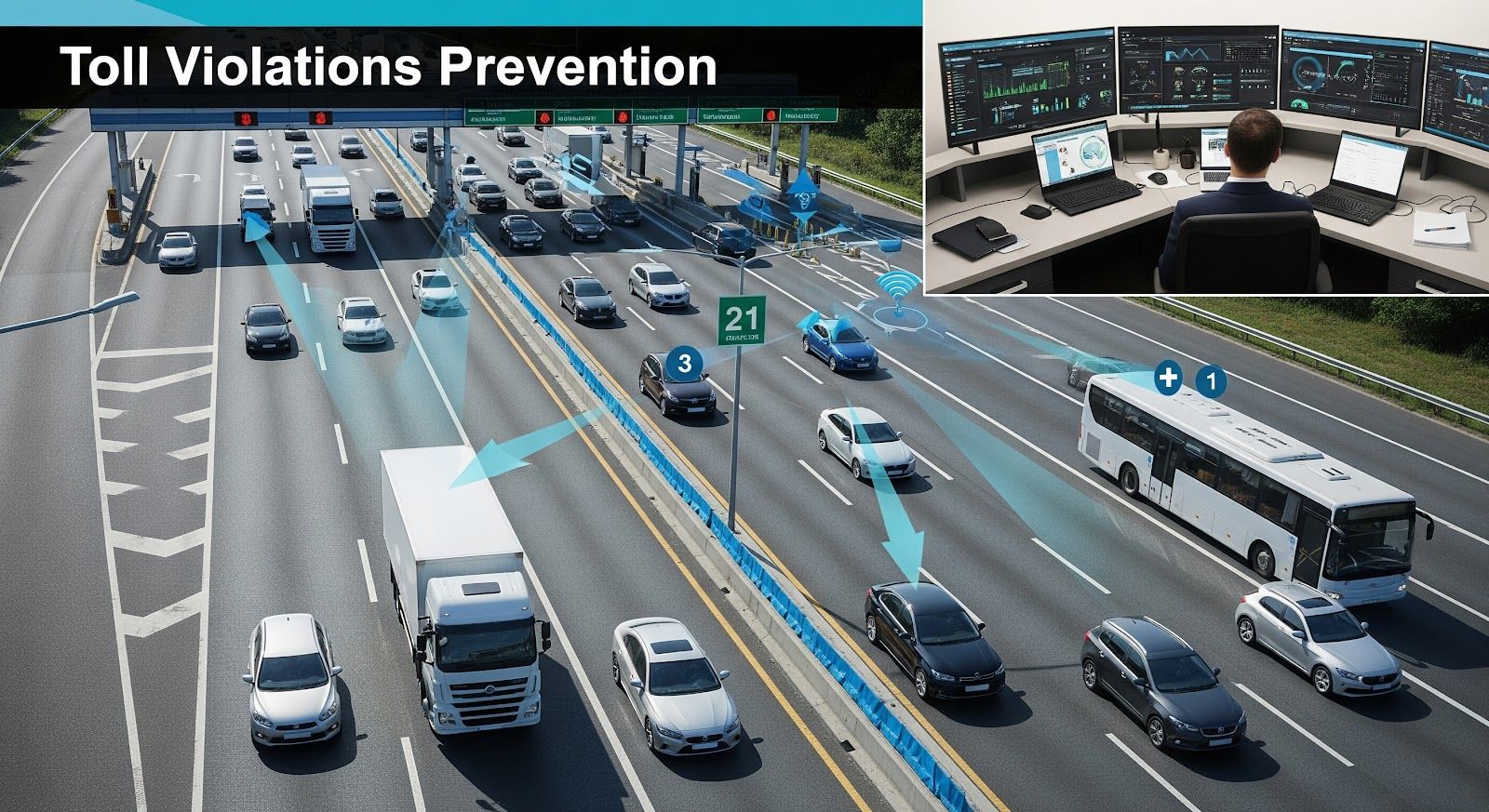Best Practices in Managing and Preventing Toll Violations

Toll violations occur when a vehicle travels through a toll zone without properly paying the required fee. This can happen for a variety of reasons—such as a missing or inactive transponder, incorrect license plate registration, or a misread by the tolling system. While occasional toll violations may seem like minor incidents, they can quickly escalate into costly and time-consuming issues for fleets of all sizes.
For commercial fleets and owner-operators, toll violations are more than just a nuisance—they represent a significant operational and financial risk. Each violation can trigger administrative fees, penalty charges, and potential registration holds, all of which add up quickly when multiplied across dozens or hundreds of vehicles. Even a small oversight in transponder management or license plate registration can result in thousands of dollars in fees and labor hours to resolve.
Moreover, repeat violations can lead to damage in a company’s reputation, especially for those bidding on contracts that require strict compliance standards. For owner-operators, toll violations can directly cut into already tight margins, eroding profitability and disrupting schedules. With the rise in toll-by-plate systems and complex tolling networks across the U.S., the likelihood of errors—and the cost of not catching them early—has never been greater.
In this article, we’ll cover the best practices for managing and preventing toll violations to help you maintain compliance, save money, and keep your fleet running smoothly.
Common Causes of Toll Violations
Understanding why toll violations occur is the first step to preventing them. While tolling technology continues to improve, many violations stem from small oversights or gaps in fleet management practices. Below are the most common causes of toll violations and how they impact commercial vehicles:
1. Missed Tolls Due to Broken or Missing Transponders
Transponders are the backbone of electronic toll collection—but if a transponder is damaged, deactivated, improperly mounted, or missing altogether, the toll system can’t record the transaction properly. Instead, the vehicle may be flagged as unpaid, resulting in a violation and additional fees. This is particularly common in fleets with high driver turnover or frequent vehicle reassignments.
Prevention Tip: Perform regular transponder audits and use a toll management system that alerts you when a transponder is inactive or missing.
2. Incorrect License Plate Information
Many tolling systems use license plate recognition as a backup method when a transponder isn't read. If a vehicle’s plate number is entered incorrectly in the tolling system—or if the plate changes without being updated—it can result in violations or misapplied tolls. This issue is especially common in fleets that frequently add, remove, or transfer vehicles.
Prevention Tip: Automate license plate updates and verify changes through a centralized toll account platform like Bestpass.
3. Expired or Misconfigured Toll Accounts
When toll accounts are not kept up to date—whether due to expired payment methods, missing vehicle data, or incorrect account settings—toll charges may be declined or misrouted. Some fleets mistakenly assume their account is in good standing, only to discover violations have accumulated over time.
Prevention Tip: Schedule monthly account reviews and set up alerts for billing or configuration issues that could affect toll transactions.
4. Toll-by-Plate Misreads
Even when a license plate is properly registered, toll-by-plate systems can sometimes misread plate numbers due to dirt, damage, camera angle, or weather conditions. These misreads may cause tolls to be assigned to the wrong vehicle or not recognized at all, leading to unexpected violations.
Prevention Tip: Use a toll management partner that offers misread correction and toll-by-plate backup coverage to reduce the risk of violations.
5. Route Planning Errors or Unregistered Vehicles on Toll Roads
Not all toll roads are covered under every toll program. If a vehicle travels through a toll area without compatible transponder coverage or is not registered for toll use, the system may treat the trip as a violation. This is especially common for fleets operating in new geographic areas or adding routes without updating toll coverage plans.
Prevention Tip: Map toll routes in advance and ensure that all vehicles are properly equipped and enrolled in the correct toll programs based on their region and expected routes.
By identifying and addressing these root causes, fleets can dramatically reduce toll violations and avoid the snowball effect of fines, lost time, and compliance issues.
The Cost of Toll Violations
Toll violations are not just isolated, one-off issues—they can carry significant financial and operational consequences for commercial fleets and owner-operators. Left unmanaged, these costs can multiply quickly and affect everything from your bottom line to your ability to operate legally on the road.
1. Financial Penalties and Administrative Fees
At the core of every toll violation is a financial penalty. In many cases, the original toll fee is minor—but it’s the added administrative fees, late charges, and penalties that cause costs to spike. A $5 missed toll can turn into a $50 violation within weeks if left unresolved. Multiply this by hundreds or thousands of vehicles and trips, and the numbers can balloon into tens of thousands of dollars in lost revenue each month.
Impact: Some fleets unknowingly spend thousands on violations they could have prevented with better toll management.
2. Time Spent Disputing Violations
Beyond the direct costs, toll violations consume valuable time. Fleet managers and administrative staff are often forced to spend hours on the phone with tolling agencies, gathering documentation, filing disputes, and following up. Each violation case requires review, response, and recordkeeping—creating an administrative bottleneck that drains productivity from your operations team.
Impact: Companies have reported spending dozens of hours per month just managing toll disputes—time that could be used for revenue-generating activities.
3. Risk of Vehicle Registration Holds or Legal Implications
In some states, unpaid toll violations can escalate into more serious consequences, including registration holds, impoundment risk, or legal action. If a vehicle has an excessive number of unpaid tolls, the DMV may prevent registration renewal, effectively sidelining that vehicle until the debt is cleared. For fleets that rely on uptime and tight delivery schedules, this can cause unexpected service interruptions and lost contracts.
Impact: One vehicle being temporarily sidelined can delay deliveries, breach service-level agreements (SLAs), and cost customers.
4. Negative Impact on CSA Scores
While toll violations may not directly affect a fleet’s Compliance, Safety, Accountability (CSA) score in every jurisdiction, repeat violations and unpaid fines can still have reputational consequences. Clients and partners may view frequent toll issues as a sign of poor fleet management or noncompliance, which can hurt your ability to win new business or maintain existing contracts.
Impact: Reputation matters—especially for carriers working with government contracts, major shippers, or regulated industries.
The true cost of toll violations goes far beyond the price of a missed toll. It’s a combination of financial penalties, wasted time, legal exposure, and operational setbacks. Proactively managing toll compliance isn’t just smart—it’s essential for protecting your profitability and reputation in a highly competitive industry.
Prevention Starts with Planning
The best way to deal with toll violations is to prevent them before they ever happen. While tolling systems can be complex, avoiding violations starts with good planning and proactive fleet management. By implementing a few foundational practices, fleets of any size can dramatically reduce risk and ensure smooth travel across toll roads.
1. Keep License Plates and Vehicle Data Up-to-Date
One of the most common—and easily preventable—causes of toll violations is outdated or incorrect vehicle information. If a vehicle’s license plate is not properly registered with the tolling authorities or your toll management system, toll-by-plate reads won’t match your account, resulting in violations or misapplied tolls. This issue can also occur when plates are reassigned or replaced, and the change isn’t reflected in the system.
Best Practice: Create a standard operating procedure (SOP) for updating license plate information whenever vehicles are purchased, retired, transferred, or serviced. With Bestpass, these updates can be made in bulk through an easy-to-use dashboard or automated via API integration with your fleet management system—eliminating the need for manual tracking.
2. Regularly Audit and Monitor Transponder Inventory
Transponders are the gateway to seamless toll payments, but they can easily become a liability if not properly tracked. A transponder that is lost, damaged, expired, or incorrectly mounted may not register at toll gantries, leading to missed transactions and violations. With large or fast-moving fleets, these problems can go unnoticed until penalties begin to appear.
Best Practice: Conduct routine transponder audits—monthly, quarterly, or after vehicle changes—to verify every unit is active, mounted correctly, and assigned to the right vehicle. Bestpass provides automated alerts and reporting tools that help you monitor the health of your transponder inventory in real time, making it easier to catch problems before they become costly violations.
3. Use Real-Time Toll Tracking Systems (Bestpass Advantage)
Visibility is key when it comes to toll compliance. If you're not actively monitoring toll activity, it's easy to miss violations until you're hit with a late notice or large bill. A real-time toll tracking solution allows you to monitor every toll transaction as it happens, giving you the chance to identify issues immediately and take corrective action.
Best Practice: Implement a toll management platform like Bestpass, which offers real-time toll tracking, violation alerts, and intuitive dashboards. Users can monitor toll charges across the entire fleet, filter by vehicle, region, or date, and even set up automatic notifications for anomalies. This allows you to resolve issues within hours—not weeks.
4. Map Routes Based on Toll Road Compatibility
Not every transponder or toll program is accepted on all toll roads. If a vehicle travels into an area not covered by its toll plan—or a road that doesn’t support its transponder—it may be flagged for a violation. Route planning that doesn’t take toll infrastructure into account can inadvertently send vehicles into non-compliant zones, increasing the risk of errors.
Best Practice: Incorporate toll compatibility into your route planning process. Before dispatching vehicles, ensure that the planned route aligns with the toll programs and transponders installed on that vehicle. With Bestpass’s Complete Pass or regional plans like Horizon Scout, fleets can optimize for full toll road coverage based on their operating footprint.
Toll violation prevention doesn’t require major overhauls—it starts with small but intentional steps. Keeping data clean, equipment maintained, systems monitored, and routes mapped can prevent most issues before they arise. And when paired with tools like Bestpass, fleets can gain peace of mind and control over their toll operations.
Leveraging Technology to Reduce Violations
As tolling systems become more complex across the U.S., relying on manual processes to manage toll payments and prevent violations is no longer practical—especially for commercial fleets. The most effective way to stay ahead of toll issues is to adopt technology-driven solutions that automate, track, and correct toll transactions in real time. When used strategically, these tools don’t just reduce violations—they can significantly cut costs, save time, and improve operational efficiency.
Use of Automated Toll Management Platforms Like Bestpass
Automated toll management platforms eliminate the guesswork from toll operations. Rather than juggling multiple toll accounts, statements, and transponder types, platforms like Bestpass consolidate toll activity across your entire fleet into a single, centralized system.
With Bestpass, fleets gain full toll coverage through customizable plans (including Complete Pass, E-ZPass, Horizon Scout, and Horizon Voyager) that ensure compatibility across major toll roads. The platform handles toll processing, reconciliation, and violation prevention automatically—helping your team stay focused on driving, not disputing toll charges.
Key Benefits:
- One account, one bill for all toll activity
- Automated toll charge processing and payment
- Built-in violation detection and support
Benefits of Toll-By-Plate Backup and Misread Correction
Even with well-maintained transponders, occasional misreads or gaps in coverage can happen—especially in busy metro areas or under harsh weather conditions. That’s why toll-by-plate backup and misread correction features are essential for any modern fleet.
Bestpass includes toll-by-plate as a safety net: when a transponder isn’t read, the system matches the vehicle’s license plate to your account to ensure the toll is still recorded and paid—avoiding a violation.
In addition, Bestpass actively works with tolling authorities to identify and correct misreads. This prevents incorrect charges from appearing on your bill and reduces the need for time-consuming disputes.
Results You Can Expect:
- Reduced number of violations from camera misreads
- Fewer penalties from toll-by-plate systems
- Higher toll transaction accuracy across the board
Technology isn’t just a helpful addition to toll management—it’s a necessity for fleets that want to stay competitive and compliant. Platforms like Bestpass give you full visibility, automation, and control over toll transactions, empowering your team to focus on what matters most: keeping vehicles on the road and avoiding costly violations.

